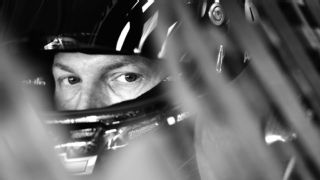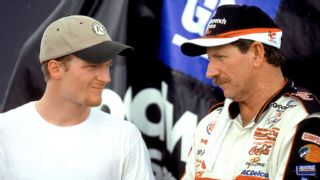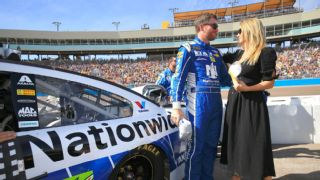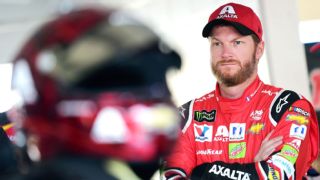|
HOMESTEAD, Fla. -- Dale Earnhardt Jr. has lived a charmed life, a blessed life, at times a surreal life and for sure an unusual life. The son of a seven-time NASCAR Cup champion, Earnhardt never attended a Daytona 500 until he raced in one. In one of the most unusual business quirks, he didn't own the rights to his own name. He has endured the loss of his father, the public drama of family dysfunction, the mental trauma of sucking on the race track and the physical trauma of concussions. What does he have to show for it? He owns two Daytona 500 victories, 26 Cup wins overall and possibly a foundation for a second career on the screen, first as an NBC racing commentator but with unlimited potential. It might seem far-fetched that the former auto mechanic could find himself as an even bigger celebrity after he retires from NASCAR Cup racing this weekend following the race Sunday at Homestead-Miami Speedway, but Earnhardt has turned from someone who once appeared more reclusive like Howard Hughes into a social media darling. He has built a wild west town on his property, proposed to his girlfriend at a church his great-great-great-great-great-great-great-great grandparents attended in Germany and appears as comfortable with stories about him in the National Enquirer as he does in Rolling Stone. "It has been odd and unexpected for sure, but I feel fortunate and -- I hate to use the word blessed because everybody uses that word a lot -- but I just feel lucky as hell to not have screwed it up somewhere along the line," Earnhardt said. He sure as hell tried. And yet along the way, he earned 14 consecutive -- likely to be 15 consecutive -- most popular driver awards. His fans initially gravitated toward him because of his last name, but he earned their loyalty and stoked an entirely new generation of fans along for the ride. "You know we raised hell and partied in the early 2000s -- Budweiser ... wanted me to just raise hell and drink beer," Earnhardt said about his sponsor during his early Cup career. "And it's a wonder what we could have accomplished if we would have just focused on racing. "But I'm pretty happy with it to be honest with you. I had a lot of fun and won a lot of races." Having fun, winning races and happiness outside the race car could have eluded someone who never drove the same way nor had many of the same interests of his father, a legend in the sport still revered nearly 17 years after his death and whose legacy and shadow have followed Earnhardt with every step. "I don't know that you are always out from under it, but it didn't bother me," Earnhardt said. "I was always compared to him and compared to his success, the person he was, people either liked I was different or didn't like that I was different and wanted me to be just like him or whatever." Earnhardt lacked discipline in the early days of his career, the days when the wins seemed to flow with a No. 8 Budweiser-sponsored Dale Earnhardt Inc. car just as easily as beer flowed through a tap. He won in just his 12th NASCAR Cup race. He won the all-star event as a rookie. He finished third in the standings in just his fourth year.  By that time, he had lived two years without his father, who perished on the final lap of the 2001 Daytona 500. Earnhardt never dreamed he could match his father's seven championships. Only his fans did. "I didn't think I was going to win any races," Earnhardt said. "I didn't think I was ever going to be a Cup driver. When I was a kid before I started racing in the Xfinity Series, I thought that I was never going to get a chance and then if I did, I wasn't going to run well enough to maintain that opportunity and keep progressing. "I just didn't look at myself with a lot of confidence. I didn't think, 'Man I'm a great driver, boy just give me a shot.' From what I could tell, I didn't know whether I was a good driver or not." If that sounds like a grounded person, there's a reason for it, said his sister, Kelley Earnhardt Miller. "For Dale and I, when we were growing up, life was really normal," Earnhardt Miller said. "It wasn't normal -- we had Dale Earnhardt as a dad. But they kept it normal. We were at home with relatives and friends. "We didn't have all kind of lavish stuff. We weren't bestowed presents every day or anything like that. We grew up normal. We grew up earning things. We had chores. We had an allowance. And that's the time in your life when the grounded-ness was instilled. Dale was able to carry that. Those things were established for us very early on in our lives." His father's death incredibly impacted him, both on the track and off. He seemed lost at times, felt uncomfortable as the superstar (especially, in of all places, bar settings), and couldn't find a footing for his role on his team, let alone the sport. He nearly died in a crash in 2004 while competing in a sports-car race at Sonoma Raceway. His car engulfed in flames, Earnhardt scrambled out of the car. Afterward, he asked who pulled him out. He was told no one. He wondered if his father's spirit had something to do with it. "When Dale Jr. first started, it was all about he wanted to please Dale," said Tony Eury Sr., crew chief for Earnhardt -- and Earnhardt's uncle -- for his two Xfinity Series championships and first four Cup seasons. "That was his deal. He wanted to please his dad. He wanted his dad to be proud of him. He wanted to race. That is all he wanted to do. "And I think that was his philosophy all the way to when his dad died. When his dad died, it was kind of like he didn't have anybody to please anymore. We kind of had a problem with him after that. He didn't know if he wanted to do this anymore or that. We went to the racetrack with a driver that wasn't very focused." After his father's death, Earnhardt's stepmother Teresa controlled Dale Earnhardt Inc. Earnhardt wanted to own a piece of a team, and that was an apparent conversation non-starter when his contract came up for renewal in 2006. Earnhardt ended up leaving to drive for Rick Hendrick, who had a storied career as a car owner -- and once co-owned cars with Earnhardt's grandfather, Robert Gee. "I never thought I would have an opportunity to race for a team like that, one of the best in the business," Earnhardt said.  Earnhardt, who had co-owned Chance 2 Motorsports with DEI and won two Xfinity Series titles with Martin Truex Jr., had also already restructured his own racing team with his sister in charge. It was called "JR Motorsports" and pronounced, at its inception, as "Jay Are" because he couldn't use "Junior" since Teresa owned the rights to his name through an agreement he had signed with DEI. He eventually landed the rights to his name in 2006. When Earnhardt went to Hendrick, he was joined by his cousin Tony Eury Jr. because, well, family and business had always mixed. It's more fun to go to the track and race with your buddies. That pairing didn't work that well and Earnhardt fell into a dark place as far as his performance. He knew two things kept him employed -- his last name, which brought sponsorship, and a never-give-up attitude of Hendrick, who couldn't stomach the idea of a legacy as a great owner who couldn't return the sport's favorite son to new heights. "There were a few years where I wouldn't have blamed him if he had let me go or moved on to something else or made a change," Earnhardt said. "To have the opportunity that I did for him to hang on and us to get back to Victory Lane, those are blessings, man. "I know not everyone gets that opportunity. And I know that I've got to be thankful for that chance to get an opportunity to win again." Paired with crew chief Steve Letarte, Earnhardt thrived. He finally had a crew chief who held him responsible, and made the driver realize that he needed to commit himself. They enjoyed success, and Earnhardt -- embarrassed by the attention in previous seasons where he didn't feel his performance warranted such coverage -- basked in making the NASCAR playoffs for four consecutive years. Earnhardt also found love. He met an interior designer named Amy Reimann, who worked on Earnhardt's house in 2009, and they started dating. She taught him how to enjoy race weekends more by leaving the motor home and going out for dinner. He fought with himself on how to treat someone, to stop playing video games and being so selfish. It took a couple of years for them to make public appearances together. Earnhardt worried that the judgment of fans might be too tough for them to handle. They married on New Year's Eve and expect their first child next May. "I've been able to make a lot of money and live a lifestyle that I never dreamed of," Earnhardt said. "And I've been able to provide for my family. I met an incredible woman that I'm married to, and I just feel blessed. "I don't know how else to explain it." And then he does:  "Amy believes in Law of Attraction -- like if you want something to happen, you visualize it and you bring that into your life," Earnhardt said. "And I'm the opposite. I just sit there going, 'Oh, what's going to happen?' So, I guess it's because of all those experiences, I'm just assuming there's some big hurdle coming up down the road because there always seems to be something. "But I think having that mindset of not having expectations and then great things happening to you, you're just overwhelmed and feeling fortunate and blessed." He also eventually found himself comfortable with being Dale Earnhardt Jr., and not Dale Earnhardt Sr.'s son. He isn't sure exactly when. "He no longer worries about having to live up to my dad or live up to some certain expectation," Earnhardt Miller said. "He's gotten comfortable in his own skin of who he is and who Dale Earnhardt Jr. is, which is what he's always wanted to be. "That's why he turned the hair blonde and did all these things of the younger days to be different and he wasn't my dad. He's sort of come into his own." With the increase in self-confidence came a breakthrough moment when he won the 2014 Daytona 500. As part of the celebration, he relented to the pressure of joining social media, and fulfilled a pledge to join Twitter if he won the sport's biggest race. His first tweet -- a photo of him and the Daytona 500-winning Harley J. Earl Trophy -- started a new outlet for him to connect with his fans. His authenticity and genuine love for the medium has only added to his stardom. "I feel that Hendrick Motorsports has put his guard down in some ways and he's let us all look into his life much more and be a part of it," said seven-time Cup champion and teammate Jimmie Johnson. "I think social media has added a layer of that. "I think his relationship with Amy and their marriage and now they're expecting their first child. I think through all of that we've been able to learn and understand Dale far more and he's been comfortable later in his career to let that personal side come through and shine through, through traditional media and social media and all those things." It also has turned him into a concussion-awareness advocate, just by allowing him to tell his story in great detail. The concussions started early in his career. The first one, in the 1998 Xfinity Series race at Daytona, kept him from staying for the 1998 Daytona 500. He would have another in a crash in 2002 and possibly suffered another in 2003. Earnhardt never missed races because of his concussions until 2012. He wrecked Aug. 29, 2012, in a tire test at Kansas Speedway. About six weeks later, in the Oct. 7 race at Talladega, Earnhardt crashed, having his car spun around. The two different concussions -- the impact from his Kansas crash caused a typical concussion with fogginess in his head while the Talladega crash caused a concussion to the base of his brain where the spine connects, triggering anxiety -- forced him to miss two races. Four years later, Earnhardt found himself struggling with his balance as his vision started to decline to the point where he couldn't focus on objects in the distance while he moved. He went to see Dr. Micky Collins, the concussion expert whom Earnhardt worked with in 2012, and Collins immediately diagnosed him with a concussion that they believe occurred in the June 2016 race at Michigan. Earnhardt knew he had to sit out races until he got healthy. His condition continued to deteriorate, and he didn't worry about driving again. Day after day, he felt scared his vision would never recover, causing him balance issues for the rest of his life. "I [initially] couldn't put one foot in front of the other without falling over like a drunk-driving test," Earnhardt said. "I couldn't take one step without having to step to the right or step to the left to catch myself. ... There was a lot of time in there during the recovery where there were days where I was 90 percent sure I wasn't going to drive again." Not until Earnhardt and his doctors decided to pull the plug on the rest of the 2016 season did Earnhardt start to get better. The stress of having to get better in a hurry evaporated, and Earnhardt could focus on his recovery. He eventually got to the point where he could test a race car and return to action. Shortly after he returned for the 2017 season, Earnhardt knew he would not extend his contract beyond 2017. He wanted to go out on his own terms, but he also knows that every time he flips the ignition, he is playing roulette with his health.  He didn't get back into a race car without his family worrying. Eury Sr. said he told Earnhardt: "Don't let anybody make you do anything you don't want to do. You've got a good life. Let's keep it that way. You don't want to be a vegetable the rest of your life. You don't know what's going to happen. Just make your choice, your choice, not somebody else's.'" The 2017 season hasn't gone the way Earnhardt would have hoped. He hasn't won a race. He didn't make the playoffs. It appears he will finish 21st in the standings. And he's fine with that. "Maybe people felt that it might be a given that we would have won a championship in our career at some point at the Cup level, but when I look at the accomplishments, I know I'm disappointed we didn't win a championship, but I never thought I would even get close," Earnhardt said. "I never thought I would ever win a Daytona 500. I never thought we would sweep Bristol. I just never thought any of that stuff was going to happen or be possible." After he steps out of the car Sunday, he'll race again. He has committed to at least one Xfinity Series race for next season. But he will start new careers, one that includes being a father and another in front of the camera. "I'm excited for Dale to experience a life that he doesn't really know much about," said Earnhardt Miller. "He got a little hint what some sort of normal would be when he was out with the concussion -- not that he was normal. "He was unhealthy. But just being able to decide what you want to do on a weekend." When he joins the NBC broadcast booth next year, Earnhardt believes that could be the moment he truly steps out of his father's shadow. It took retiring from stock cars to do it. "Hopefully, I'm just as proud of my accomplishments in the booth as I am on the racetrack," Earnhardt said. "I would love for that career to be a success and that would definitely be out from under his shadow. "But [being out of that shadow] is not something I really put a lot of thought into. I just miss him so bad and wish he were here today to see all this happening. I think you will always be compared to him one way or another for better or for worse as long as I'm around, I guess."
|
